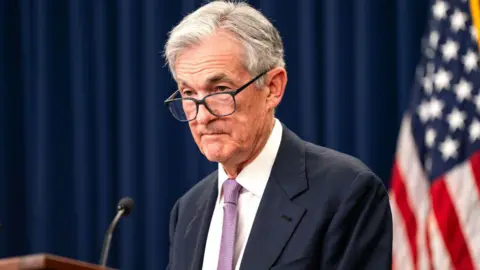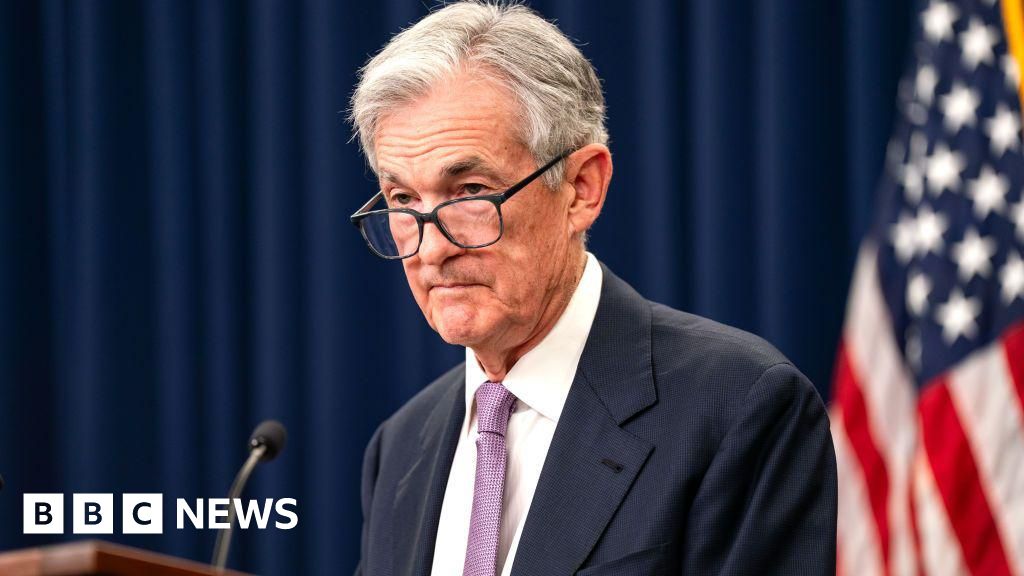 Getty Images
Getty ImagesThe head of the US central bank has hit back at speculation that his post is in jeopardy as Donald Trump prepares to take power in Washington.
Federal Reserve Chairman Jerome Powell said he would not resign if President Trump asked him to do so, saying it was “unlawful” for the White House to force him to step down.
Powell was responding to questions from reporters at a news conference after announcing borrowing cost cuts that would lower the Fed’s key lending rate to a range of 4.5% to 4.75%.
Forecasters expect borrowing costs to fall further in the coming months, but President Trump’s plans for tax cuts, immigration and tariffs could maintain inflationary pressures and increase government borrowing, making those bets more likely. He warned that it could be complicated.
President Trump has promised to impose import duties of at least 10% on all goods imported into the country, a cost that economists say will be passed on to consumers and lead to higher prices.
Tax cuts could spur inflation by encouraging spending, while President Trump’s proposed mass immigration deportations could create a gaping hole in the U.S. workforce and drive up wages.
Reflecting these concerns, U.S. Treasury yields have already risen this week.
Powell said Thursday it was too early to say how the new administration’s policies would affect the U.S. economy or how the Fed should respond.
“This is at a very early stage and we don’t know what the policy will be and we don’t know when it will be implemented,” he said. “In the short term, the election will not affect our policy decisions.”
Powell was nominated by President Trump to chair the Federal Reserve in 2017, but has since been the subject of frequent criticism.
During his first term, Trump reportedly called bank officials “crazy” on social media and consulted advisers to see if he could fire Powell.
This year, U.S. media reported that Trump’s allies were considering ways the White House could tighten its grip on the Fed, including the possibility of sidelining Powell by prematurely naming a successor. It was reported that there was.
President Trump has repeatedly said he believes he has the right to express his opinion on the Fed’s actions. He told Bloomberg over the summer that he intends to serve out his term in office until 2026, “especially if I think Mr. Powell is doing the right thing.”
But Powell said Thursday that he would not resign if President Trump ordered him to, and that any attempt to remove him before the end of his term is “impermissible by law.”
Mr. Powell has come under intense scrutiny in recent years as prices began to soar in 2022.
The bank responded that year by rapidly raising interest rates, ultimately raising them from near zero to about 5.3% as of July. This is the highest interest rate in more than 20 years.
These increases affected the public in the form of higher borrowing costs for credit cards, mortgages, and other loans, fueling dissatisfaction with rising costs of living, especially housing, which influenced elections.
The Federal Reserve began changing direction in September, cutting interest rates by a much larger 0.5 percentage point than usual, saying it believed the pace of U.S. price growth was stabilizing.
The U.S. inflation rate was 2.4% in September, down from more than 9% in June 2022, according to the latest official figures.
The rate cut announced on Thursday was widely expected and carried unanimously, making it the second consecutive rate cut and cutting interest rates by a further 0.25 percentage point.
Powell said Thursday that officials remain equally focused on maintaining price stability and the health of the job market.
Concerns about rising unemployment rose earlier this year, but those fears subsided in September after data showed an unexpectedly strong hiring surge.
But the latest figures show little job growth in October, when the country faced hurricanes and strikes.
Powell said officials expect to continue cutting rates, but it remains to be seen how quickly and by how far. He resisted questions asking for more precise guidance.
“We don’t think now is a good time to provide additional guidance. There is considerable uncertainty,” he said. “The key is to move forward, finding the right pace and destination.”
Whitney Watson, co-chief investment officer of fixed income at Goldman Sachs Asset Management, said the firm expects another rate cut in December but acknowledged there are doubts about the path forward. Ta.
“Strong economic data and uncertainty around fiscal and trade policy mean there is a growing risk that the Fed will choose to slow the pace of easing,” he said, adding that the Fed may “skip” interest rate cuts next year. He pointed out that there is a possibility that they will start to do so.
The Fed’s decision comes on the same day the Bank of England warned that inflation could rise further after last week’s Budget and that borrowing costs could take longer to fall. Ta.
“On both sides of the pond, we’re seeing expectations for future rate cuts diminish significantly compared to what many initially expected,” said Lindsey James, investment strategist at Quilter Investors. .
“In the US, interest rates are likely to remain high for an extended period of time as the Fed will need to tread very carefully until it can better assess the true impact of President Trump’s plan.”




